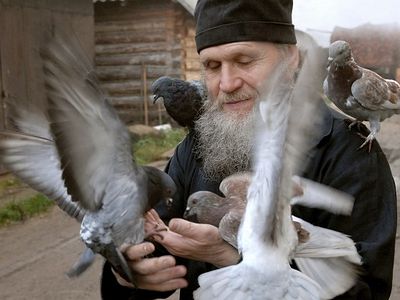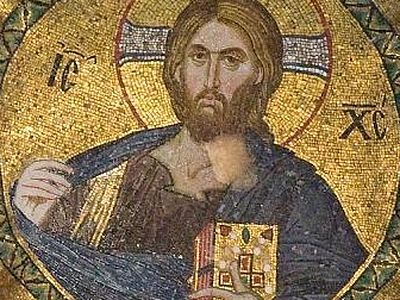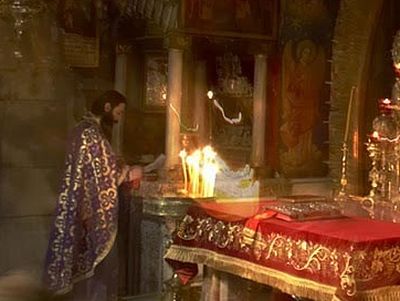Concerning the twofold state of those who depart out of this life.
1. When the soul of a man departs out of the body, a great mystery is there accomplished. If it is under the guilt of sins, there come bands of devils, and angels of the left hand, and powers of darkness take over that soul, and hold it fast on their side. No one ought to be surprised at this. If, while alive and in this world, the man was subject and compliant to them, and made himself their bondman, how much more, when he departs out of this world, is he kept down and held fast by them. That this is the case, you ought to understand from what happens on the good side. God's holy servants even now have angels continually beside them, and holy spirits encompassing and protecting them; and when they depart out of the body, the bands of angels take over their souls to their own side, into the pure world, and so they bring them to the Lord; to whom be glory and might forever. Amen.
* * *
As only those born of the seed royal can wear the costly royal pearl, so only the children of God are allowed to wear the pearl of heaven.
1. The great, costly, royal pearl, which serves for a king's crown, is suitable only for a king, and only a king can wear it. Another man is not allowed to wear such a pearl. So unless a man is begotten by the royal Spirit of God, and is made to be of the royal family of heaven and a child of God, according as it is written, But as many as received Him, to them gave He power to become children of God,1 he cannot wear the costly pearl of heaven, the image of the inexpressible light, which is the Lord, being no king's son. For those who possess and wear the pearl, live and reign with Christ forever. So said the apostle, As we have worn the image of the earthy, we shall also wear the image of the heavenly.2
2. As long as a horse grazes in the scrub among the wild animals he is in no subjection to men; but when he is caught for the purpose of taming, they put on him a heavy bridle, until he learns to walk properly and in good order. Then he is exercised by a skilled rider, that he may become serviceable for war; then they put armor on him, the breastplate and the coat of mail, and first they hang up a bridle and shake it before the horse's eyes, that he may get accustomed to it and not shy at it; and when thus taught by his rider, he learns to war with the enemy. Without rider and without breastplate, a horse is of no use for war. But when he has been trained and is accustomed to the war, he no sooner smells the battle and hears the sound of it, than he charges readily upon the enemy of his own accord, so that the sound that he makes is enough to strike terror into the foe. In like manner, the soul, which since the transgression is wild and in no subjection, roams3 in the desert of the world with the wild beasts, which are the spirits of wickedness, in sin withholding service. But when it hears the word of God, and believes, it is bridled by the Spirit, and puts away its wild ways and the fleshly mind, being guided by Christ its rider. Then it gets into distress, and the process of taming, and difficulty, that it may be proved, in order that by degrees it may be brought into subjection by the Spirit, the sin that is in it diminishing by degrees and disappearing. Thus the soul, putting on the breastplate of righteousness, and the helmet of salvation, and the shield of faith, and the sword of the Spirit,4 is taught to war against its enemies. Thus, being armed with the Spirit of the Lord, it contends against the spirits of wickedness, and quenches the fiery darts of the wicked one. Without the armor of the Spirit, it does not come into the righting line; but when it has the Lord's armor, as soon as it hears and perceives hot battles, it goeth on, as it says in Job, with a shout and a cry,5 because at the very sound of its prayer the enemies fall prostrate. Thus having contended and conquered in the battle by the Spirit, it carries off crowns of victory with great boldness, and thus rests with the heavenly King; to whom be glory and might forever. Amen.




